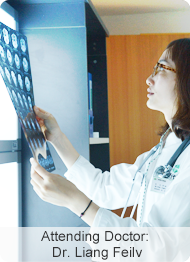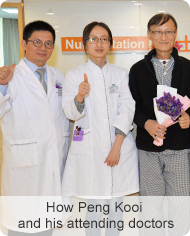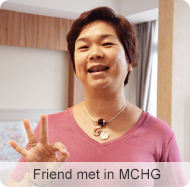


I’m How Peng Kooi, a late-stage nasopharyngeal cancer patient from Malaysia. I was diagnosed with stage I nasopharyngeal cancer in May, 2014.Like many other cancer patients, my journey against nasopharyngeal cancer was not smoothly. I first refused Malaysian doctor’s suggestion of systemic chemotherapy because of fear; In my lowest moment, I tried nutritional meal and herbal medicine without doctor’s guidance, which turned out to be unscientific and inadvisable. My neck tumor has kept growing since October 2016, along with symptoms like suppuration, difficulty in eating, speaking and moving, etc.. What’s worse, my tumor......[Learn more]

How Peng Kooi had developed progressive cancer cachexia when he was first admitted to our hospital. Symptoms of cancer cachexia include progressive weight loss, muscle atrophy, fatigue, weakness, and significant loss of appetite, etc. Cancer cachexia is considered the immediate cause of death of a large proportion of cancer patients, ranging from 10% to 25% of the patients.
Since the patient was too weak and malnourished to take treatment, we first improved his immunity by giving him traditional Chinese medicine and nutritional therapy. Then we conducted interventional therapy to kill the cancer cells.
His tumor shrinks as treatment continues, the tumor shrank by 50% after the second session of interventional therapy, 70% after the third session, 90% after the fourth and fifth session. Now, he look like a normal person.[Learn more]

I took the first session of interventional therapy on October 26th, 2016. It was totally different from the surgery I learned on the internet before. It was a kind of arterial chemotherapy, with few side effects. The whole procedure only lasted for 30 minutes, except for slight heating on my neck, I seldom felt any pain. My physical condition was improved after the treatment.[Learn more]

Unlike hospitals in Malaysia, cancer patients in MCHG not only have one doctor to conduct the diagnosis and treatment, but also a whole multidisciplinary team consisted of doctors from department of Interventional Therapy, Imaging, Cancer Diagnosis to conduct joint consultation and make individual treatment plan, which greatly minimizes patients’ suffering and maximizes the treatment effect.
During my hospitalization, every day I have several doctors to check and follow my condition. It makes my families and me feel relieved.[What is Multidisciplinary Team?]

My husband also got nasopharyngeal cancer, when I knew How Peng Kooi got great treatment effect in St. Stamford Modern Cancer Hospital Guangzhou, I quickly decided to come here, hoping my husband to restore to health as soon as possible. I want to tell other cancer patients that there is a good cancer hospital in Guangzhou, China, named St. Stamford Modern Cancer Hospital Guangzhou. Here, we fight together to defeat cancer![Read more nasopharyngeal cancer patient stories]
For more information about nasopharyngeal cancer treatment, please call 09628389559 or consult now
Disclaimer: Therapeutic effect depends on individual patient's condition. The content of this website is for informational purpose only,this can not be the basis of medical diagnosis and treatment and even can not replace the diagnosis and treatment from doctors.Please refer to Terms and Condition for more information.